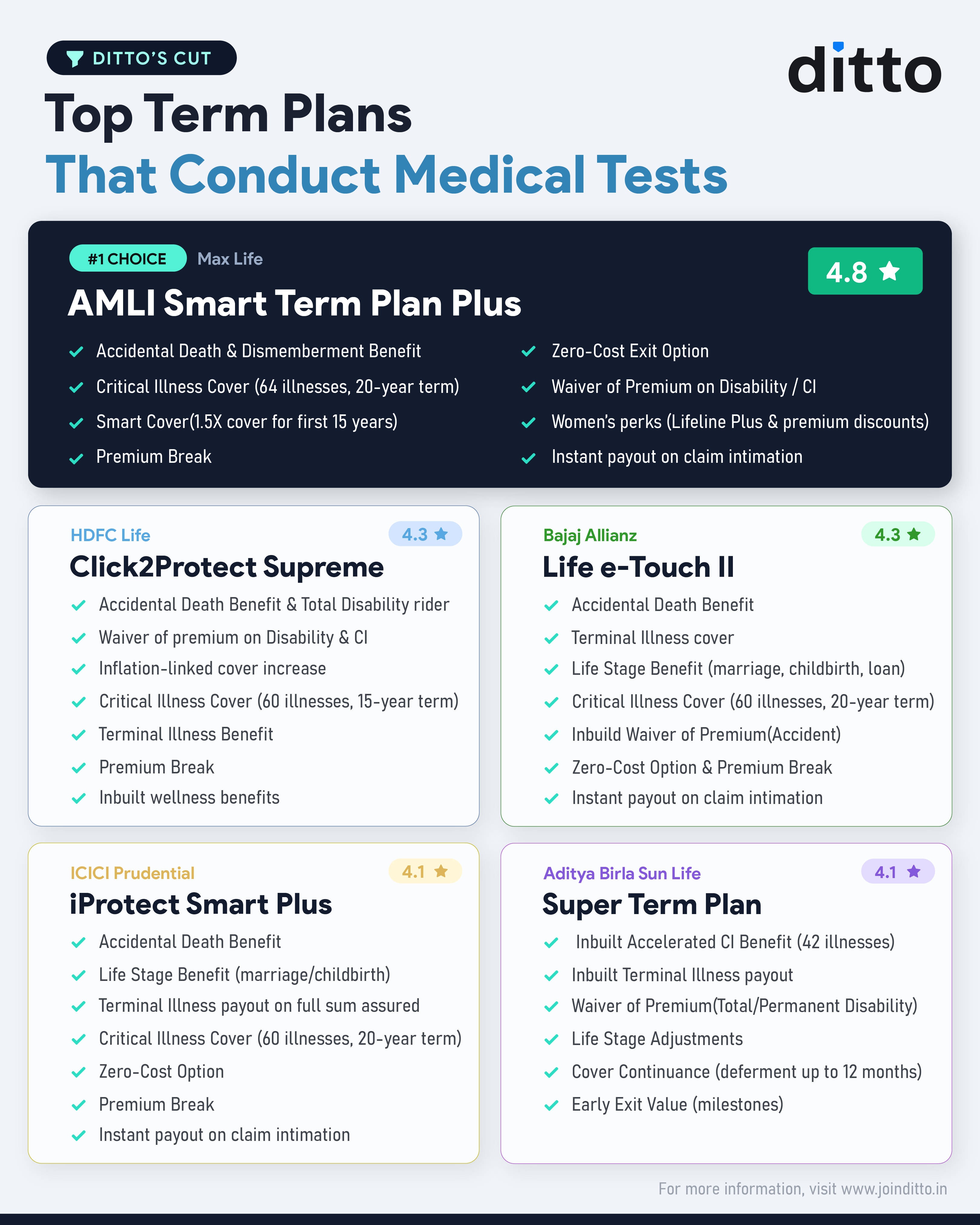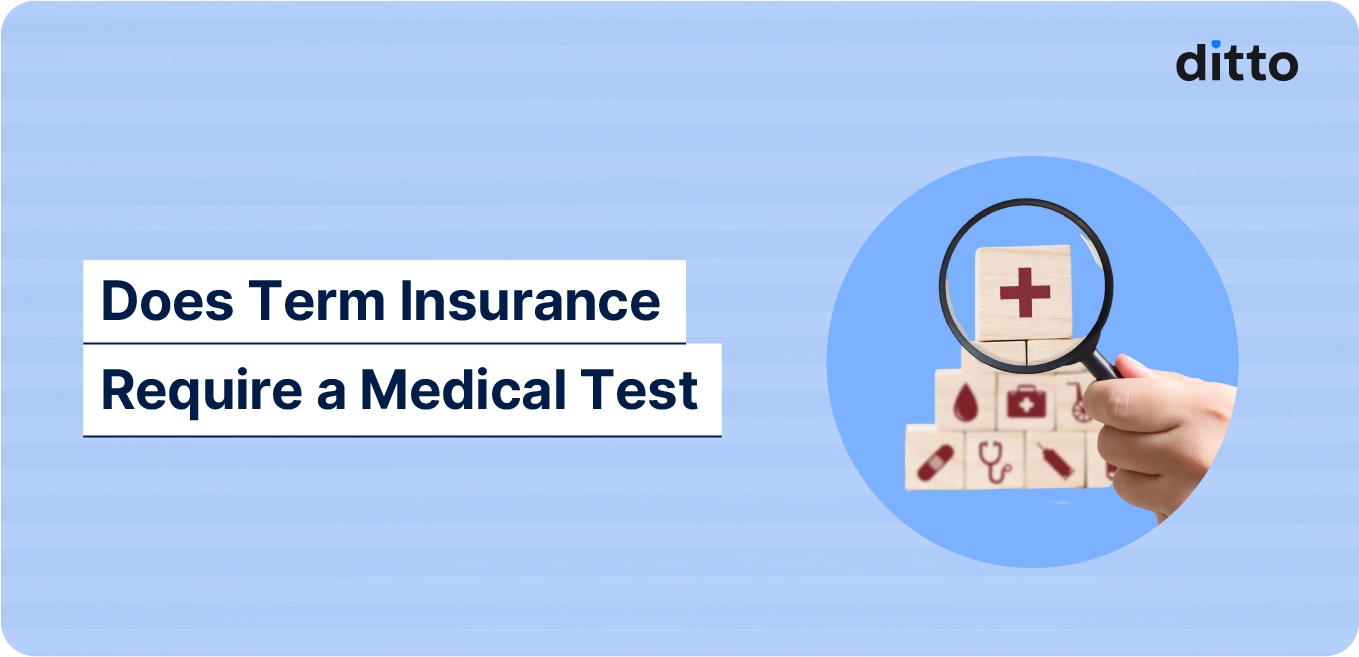Does Term Insurance Require a Medical Test?
Buying term insurance is one of the best ways to secure your family's financial future. However, you must undergo one crucial step before getting started: a medical test. Whenever you apply for a term insurance policy, the insurer will likely ask you for a test, followed by your medical reports.
A medical test for term insurance is like a quick health check to help insurers understand your health. But are there any roadblocks? If so, how can they be overcome? This guide aims to answer these questions in detail.
Note: Medical tests aren't always legally mandatory, but in most standard term plans, insurers prefer or insist on them.

Why is a Medical Test Required?
Evaluation of Risk for the Insurer
Medical tests assess your current health status, including blood pressure, blood sugar levels, and liver and kidney function. This helps the insurer understand the risk they're taking on by offering you a large life cover policy.
Determines Eligibility, Premium, and Coverage
Your medical report plays a direct role in deciding whether your policy gets approved, how much coverage you’re eligible for, and whether you pay the base premium or a higher, “loaded” premium.
Helps Avoid Fraud
When tests confirm your health status, it becomes harder for anyone to submit false information. This protects both you and the insurer from future disputes, cancellations, or legal issues.
Long-term Financial Protection
A thorough medical check helps the insurer accurately price your risk. That means your policy is more sustainable in the long run, and your family is more likely to get the full benefit if something happens to you.
Helps in Setting the Right Sum Assured
Your health profile influences how much cover the insurer is willing to offer. Clean, clear reports make it easier for them to approve a higher sum assured that matches both your needs and your risk level.
Ensures Rightful Claim Settlement for Your Family
When your policy is based on proper medicals and full disclosure, the chances of claim disputes are significantly reduced. This substantially reduces the chances of claim disputes for your family.
List of Medical Tests Conducted in Term Insurance
The exact list usually varies by insurer, age, cover, or profile. Any test suggested by the underwriter based on reports or history. Most tests are done at home or in a nearby diagnostic center, paid by the insurer.
Meanwhile, here are some typical tests conducted in term insurance:
- Basic Tests:
- Physical Exam: Height, weight, BMI, blood pressure, pulse
- Blood Tests:
- Fasting Blood Sugar / HbA1c (Diabetes)
- Lipid Profile (cholesterol, triglycerides)
- Liver Function Test (LFT)
- Kidney Function Test (KFT)
- Complete Blood Count (CBC)
- Urine Test: Protein, sugar, infection markers
- Additional Tests (Based on age/risk)
- ECG/TMT to check heart function
- Chest X-ray for lungs and heart silhouette
- 2D Echo/Stress test for older age / large cover
- Ultrasound of the abdomen (if liver/kidney issues suspected)
- HIV, Hepatitis B/C (a standard in higher coverage)
- Treadmill test (TMT) for 40+ or high cover
- Special tests (only if flagged)
- Pulmonary function test (for asthma/COPD history)
- Thyroid profile
Quick Note: The cost of medical tests is covered if done within India. However, if the tests are conducted outside India, the expenses need to be borne by the applicant (depending on the insurer).

What are the Common Mistakes in Medical Reports That Can Affect Your Term Plan
When it comes to term insurance, even small mistakes in your medical reports can delay approval or create claim problems for your family later. Watch out for:
- Incorrect personal details (name, DOB, gender) on forms or lab reports
- Hiding or underreporting pre-existing conditions like BP, diabetes, thyroid issues
- Skipping past illnesses, surgeries, or long-term medications in your health history
- Inconsistencies between your proposal form and medicals (especially smoking/alcohol/BMI)
- Lab-side errors like wrong data entry, mismatched reports, or faulty uploads. If something is miswritten, clarify it politely on the spot and get it corrected.
- Failing to follow fasting or pre-test instructions leads to abnormal sugar/cholesterol readings. Avoid alcohol and hefty meals the previous day.
- Randomly stopping regular medicines without a doctor’s advice before tests.
- Not reviewing your report summary or correcting wrong remarks.
Legal and Ethical Considerations of Medical Testing
When conducting a medical test for term insurance, the insurance company must consider several legal and ethical factors to protect the prospective policyholder's interests.
Legal Aspects:
- Adhering to healthcare regulations while conducting the tests.
- Ensuring that the tests are appropriate and necessary.
- Obtaining the applicant’s informed consent.
Ethical Considerations:
- Maintaining utmost secrecy of the test results obtained.
- Making the information available to only authorised personnel.
- Avoiding discrimination against test results, i.e., rejecting applications unjustly based on the results.
- Using the test results fairly for risk assessment.
- Respecting the applicant’s right to know their test results and how those results are being used.
Remember: The lab/test center won’t provide the report directly to you. First, the insurer receives your medical report and then shares it with you via email or attaches it to your policy documents after your policy is issued.
Want to find the best term insurance cover for your needs? Use our free calculator.
How Medical Test Results Affect Policy Terms
After medical tests, underwriters can:
- Accept on standard terms if the applicant is healthy. In this case, they proceed with the premiums quoted at the time of application.
- Accept the application with loading charges if someone has high BMI, mild hypertension, or borderline sugar levels. In this case, the premiums will be automatically higher (usually 25-100%).
- Impose conditions, such as excluding riders like a critical illness benefit, reducing the sum assured, or shortening the term.
- Postpone or decline the application if an individual has high uncontrolled diabetes, severe heart disease, or has undergone a recent major surgery.
Why Choose Ditto for Term Insurance?
At Ditto, we’ve assisted over 8,00,000 customers with choosing the right insurance policy. Why customers like Aaron below love us:

- No-Spam & No Salesmen
- Rated 4.9/5 on Google Reviews by 15,000+ happy customers
- Backed by Zerodha
- Dedicated Claim Support Team
- 100% Free Consultation
You can book a FREE consultation here. Slots are running out, so make sure you book a free call now.
Ditto’s Take on Term Insurance Medical Tests
If you're worried about any parameter appearing abnormally on the insurer's medicals, you can get a basic health checkup done on your own. It usually costs around ₹2,000–₹4,000 and gives you peace of mind that the insurer's report won't throw up surprises.
If something like high cholesterol or high sugar does show up, you can work on improving it over the next 3–6 months. Just keep in mind this also means delaying your term insurance coverage during that time.
If you still ask us the question, 'Does term insurance require a medical test?' our answer is yes. A little honesty, a bit of prep, and careful attention to your medical records can go a long way.
Frequently Asked Questions
Last updated on:










